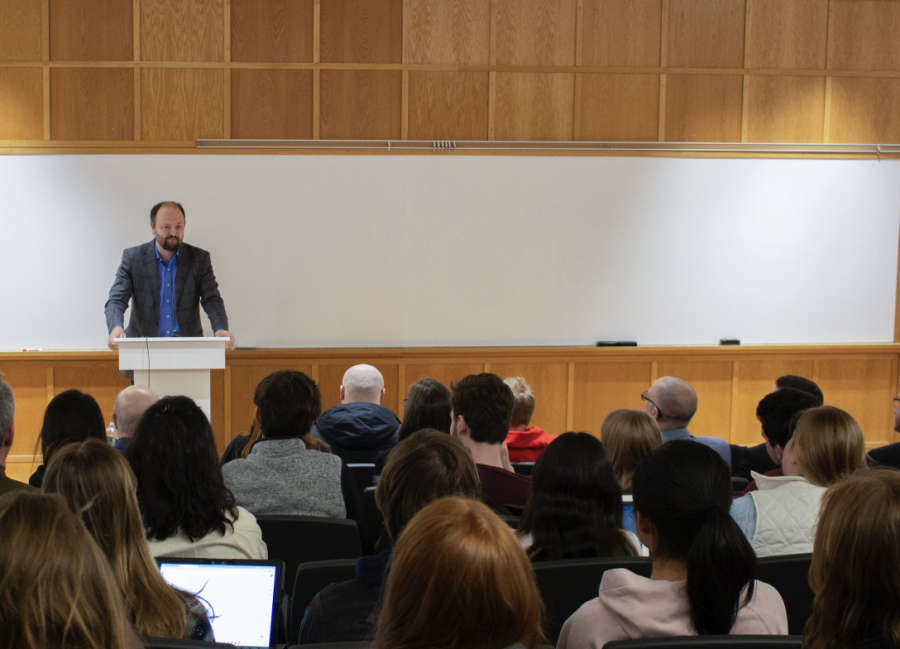Ross Douthat hosts Lecture on Religious Faith in a Secular Age
On March 30, conservative political analyst and New York Times columnist Ross Douthat hosted a lecture in Persson Hall at Colgate University. His talk, “Religious Faith in a Secular Age: What Do Young People Believe?,” discussed the role of religion in modern society, especially within younger generations, and what specific movements and events have caused a fall in religious involvement across America. Students who attended his lecture gave their opinions on the talk, as well as Robert Kraynak, professor of Political Science and co-chair of the Center for Freedom and Western Civilization who introduced Douthat.
Douthat spoke on the challenges of religious faith in an increasingly secular society, and ended by opening up the floor to questions from both students and faculty. He discussed that the story of American religion is a story of retreat, one that started roughly three generations ago.
Senior Caroline Friedman discussed how although the talk was required for her class, she was also drawn to it for her personal interest.
“I had to attend it for a class I am currently taking with Professor Kraynak, titled ‘Reason, Faith, and Politics,’” Friedman said, “Apart from this, I am very interested in religion. I am a religion major and over my time at Colgate, I have really enjoyed hearing from speakers of various denominations.”
Douthat then went through American history, describing how increasingly more money and education meant less reliance on religion and less people interested in uncomfortable concepts such as death and purpose. In the 1960’s, the ‘sexual revolution’ caused middle class Americans to drift from religion as they distanced from ideas of abstinence, homophobia, and sexism. Lastly, he touched on the intertwining of politics and religion, one that caused more divide in our country and more young people to drift from faith.
Friedman stated that what she gained most from the talk and what she was most pleased to hear Douthat discuss was the history of the United States through a religious lens.
“I was pleased that Ross Douthat talked a lot about institutional religion’s retreat. He traced moments of U.S. history, identifying the ways in which religion changed as a result of events such as World War II and the sexual revolution of the 1960s. As moral standards shifted throughout the United States, people held different views on organized religion and used religion texts and ideas for different purposes”
Sophomore Cullen Williams also attended the lecture, and discussed what he expected going into the talk and what he got out of it.
“I really didn’t know much about what he was going to be discussing and I had not really read any of Douthat’s previous work. I went because I was interested in seeing what he thought to be events that led to the downfall of religion in our society, and it was super interesting to hear from him. He was clearly very knowledgeable on the subject and he was an effective speaker. It left me thinking about what morals have shifted in America and if the drift away from these morals and strict religions was inherently bad.”
Lastly, Friedman touched on what Douthat claimed that surprised her the most from the talk.
“Douthat talked a bit about the marginal people in religion: those who may not feel strongly about their religious identity. He explained that these are the people who show the “influence of the church,” meaning that, if more marginal people seem to be following Christian traditions or attending services, this may suggest that the church is doing a good job of inspiring religion”
Williams stated why he thinks talks like this are important.
“A lot of people on campus, I feel, are just unaware that talks like this are going on every week at campus. These knowledgeable speakers visit to give really provoking talks, and by going to them we engage in new viewpoints and think about topics we haven’t thought about in awhile.”
Kryanak highlighted what he hoped that students and faculty who attended got from the lecture.
“I hoped that students would get an overview of the spiritual condition of American society over the last several generations — which Douthat explained as both an increase in church affiliation and religious belief up to the 1960’s and then a sharp decline afterwards due to rising materialism and affluence, the sexual revolution, the liberation from inherited religious traditions due to social media, and the political polarization of religion,” Kraynak said.
Despite the decline in religiosity over the years, Kraynak explained how religion will never fully disappear.
“Nevertheless, Douthat argued that religion will not disappear in the secular age because of the limits of scientific explanations for the cosmos and for human consciousness and because of the need for moral codes, which only religious belief in a transcendent God can provide,” Kraynak said.







